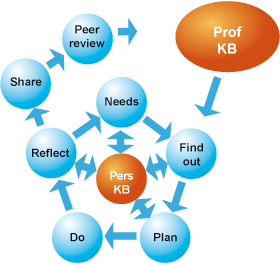Use 'Print preview' to check the number of pages and printer settings.
Print functionality varies between browsers.
Printable page generated Thursday, 5 February 2026, 7:54 AM
Wow them with Wikipedia
Course information

You will need access to:
- a computer with a web browser
- a class/group of students – groups could be within classes, whole classes, or groups across classes (e.g. clubs) and schools (e.g. collaborative projects across schools).
Duration of the course: 8.5 hours over six weeks
- Online total: 3.5 hours
- independent study 2 hours (e.g. course preparation, reflection)
- collaborative: 1.5 hours (e.g. forum discussion, posting reflective experience)
- Offline total: 5 hours
- face-to-face: 2 hours
- workplace activity: 3 hours (creating a Wikipedia page with a group of students).
Learning outcomes
Professional and reflective practitioner skills
At the completion of this course, you should be able to:
- identify opportunities for groups of learners to create content suitable for a page on Wikipedia
- reflect upon and discuss the effect on learners of creating and viewing their own page on Wikipedia
- consider how wikis may be used in other contexts to encourage learners to collaborate on multiply authored projects.
Practical skills
At the completion of this course, you should be able to:
- create pages on Wikipedia, making use of the Media Wiki editing tools
- work with learners to create a Wikipedia page
- maintain and add content to the page as a continuing project.
Knowledge and understanding
At the completion of this course, you should be able to demonstrate:
- an understanding of the issues around verifiability and accuracy of content
- an understanding of the requirements for codes of conduct for Wikipedia editing and work with learners to create a suitable etiquette for their use.
Cognitive skills
At the completion of this course, you should be able to:
- critically assess Wikipedia as a useful and accurate resource for your learners and share this assessment with others.
Course schedule
| Week | Activities | Type | Duration |
| 1 | Activity 1 Familiarising yourself with Wikipedia and its sister sites | Online | 30 minutes |
| Activity 2 Facts about Wikipedia | Online | 30 minutes | |
| Activity 3 Wikipedia as a resource for research | Online | 30 minutes | |
| Activity 4 Opening an account on Wikipedia | Online | 10 minutes | |
| Activity 5 Code of conduct for adding or editing content on Wikipedia | Online | 20 minutes | |
| Face-to-face session | Offline | 2 hours | |
| 2 | Activity 6 Posting in the forum | Online | 30 minutes |
| 3-5 | Activity 7 Working with learners on a Wikipedia page | Offline | 3 hours |
| 5 | Activity 8 Reporting back to the forum | Online | 45 minutes |
| 6 | Activity 9 Evaluation and certification | Online | 15 minutes |
| Total 8.5 hours |
Introduction

This course demonstrates how to add content to Wikipedia using the MediaWiki editing tools, with ideas for how learners can add a page that showcases their school, class or project.
It is hugely empowering for students – how often do they normally get to publish to the largest encyclopaedia in the world?
The reflective cycle
Vital courses are based on a cycle of professional reflective practice as shown in the diagram below.

This cycle draws on, and develops, personal and professional knowledge bases. The latter may be seen in the literature, resources, policies and other materials that are used to inform practice.
Throughout the course small icons will indicate the stage of the cycle being addressed.
NB Prof/Pers KB = Professional/Personal knowledge base.
Preparation for the face-to-face session

This preparation will take around one hour. We will assume that you have completed this as the course facilitator will be addressing activities 1–5 at the beginning of the face-to-face session. Make notes relating to the reflection points in the activities and bring these with you to the session.
Activity 1 Familiarising yourself with Wikipedia and its sister sites
![]() The objective of this course activity is to become more familiar with Wikipedia and its range of sister sites.
The objective of this course activity is to become more familiar with Wikipedia and its range of sister sites.
Before the facilitated session, please visit Wikipedia. You will see on the homepage just how multilingual Wikipedia has become. Click on the English version to access the encyclopaedia.
Before moving on, take a look at the English-language homepage. You will see a featured article that changes daily. Other features of this page include news items and a ‘what happened on this day’ list of historical events. There is also a picture of the day and a ‘did you know’ section. Being familiar with this opening page will help when conveying to your learners how they can make full use of Wikipedia as a resource, as well as uploading content to it later.
Wikipedia has a number of sister sites. Reflect for a moment on how you might be able to make use of these associated resources in your teaching. For example, asking students to bring in the Wikiquote ‘Quote of the Day’ to present to the rest of the class and comment on. Or you might want to encourage your learners to write short news articles for the Wikinews site, where original stories can be uploaded.
Activity 2 Facts about Wikipedia
![]() The objective of this course activity is to become more aware of some of the key facts about Wikipedia that can be used to demonstrate this resource to learners.
The objective of this course activity is to become more aware of some of the key facts about Wikipedia that can be used to demonstrate this resource to learners.
Selling Wikipedia to learners is important for them to see this as an exciting activity. Find out some key facts about Wikipedia to impress your learners. At time of writing, Wikipedia carried 3,724,503 articles but this number changes regularly. It is the largest encyclopaedia in the world and other wiki-encyclopaedias are available, but none have as many entries. To find out more about Wikipedia in order to introduce this to learners, click on the word Wikipedia in the page title ‘Welcome to Wikipedia’. Here you can find out more about the principles behind Wikipedia and why it has become a much-debated phenomenon.
Using Wikipedia for research

Activity 3 Wikipedia as a resource for research
![]() The objective of this course activity is to look at the different opinions about the accuracy and verifiability of Wikipedia and consider whether it can be a useful source of information for your learners in comparison to other resources.
The objective of this course activity is to look at the different opinions about the accuracy and verifiability of Wikipedia and consider whether it can be a useful source of information for your learners in comparison to other resources.
Wikipedia’s usefulness as a research resource is hotly debated, particularly in Higher Education where many universities discourage students from using it. The reasons given centre around the lack of verification of much of the content. Multiple authors contribute to the encyclopaedia and although the Wikipedia Foundation identifies unverified material and flags it as often as it can, there are still arguments about whether content is reliable and valid.
To understand more about this debate, skim-read the article ‘Reliability of Wikipedia’ which can be found by using the Wikipedia search facility located in the left-hand navigation bar. This is quite a lengthy article which quotes many of the independent studies that have been carried out into the content on Wikipedia pages. Pick out one or two opinions expressed in this article that will help you decide whether you would recommend this resource to your learners. You could organise a debate in class about the reliability of Wikipedia directing your learners to this page for research.
Reflect on whether you feel the issues around verification of content should discourage certain learners from using Wikipedia. How does your view of Wikipedia compare with other encyclopaedia providers? For example, Encyclopaedia Britannica has an online version, however, users have to pay £50 a year to use the full resource. Would you feel more confident about recommending this resource to your learners?
Editing Wikipedia
Activity 4 Opening an account on Wikipedia
![]() The objective of this course activity is to be able to add and edit content on your own, and others’, pages on Wikipedia.
The objective of this course activity is to be able to add and edit content on your own, and others’, pages on Wikipedia.
You can register for an account from all Wikipedia pages by clicking on the create account link at the top of the page. You are strongly recommended to create your account now as during the facilitated session you will be accessing the user area of the site. Enter your details as requested from this link to open your account. When this is complete, you will be able to add new content to the site and edit existing entries.
Log into Wikipedia with your username and password and take a look at the sister sites where multiple authoring can also take place. You may have ideas later about how to use these additional resources with students.
Activity 5 Code of conduct for adding or editing content on Wikipedia
![]() The objective of this course activity is to understand the need for a code of conduct to ensure users of Wikipedia (and other wikis) act appropriately when adding or editing content.
The objective of this course activity is to understand the need for a code of conduct to ensure users of Wikipedia (and other wikis) act appropriately when adding or editing content.
Wikipedia has a strict code of conduct for adding and editing content. This can be found here. Read through this – it is quite long. Note some of the key messages and reflect upon how these might be relevant to a group of learners preparing content for Wikipedia. How might you translate this etiquette into a form that students would use for Wikipedia, or for their own class wiki?
Information about the face-to-face session
![]() You will have received information about the venue and time of the face-to-face component of this course. You will have two hours with a facilitator and other delegates during which more information about editing Wikipedia and wiki software in general will be given. The course forum will open when this session is completed. It is important that you take notes with you from the preparatory activity as the facilitator will be discussing these at the beginning of the session. It is also important that you have registered for an account with Wikipedia prior to attending the face-to-face session.
You will have received information about the venue and time of the face-to-face component of this course. You will have two hours with a facilitator and other delegates during which more information about editing Wikipedia and wiki software in general will be given. The course forum will open when this session is completed. It is important that you take notes with you from the preparatory activity as the facilitator will be discussing these at the beginning of the session. It is also important that you have registered for an account with Wikipedia prior to attending the face-to-face session.
Following the face-to-face session
Activity 6 Posting in the forum
![]() The objective of this course activity is to make contact with participants of the face-to-face session and to have the opportunity to share ideas emerging from the course so far.
The objective of this course activity is to make contact with participants of the face-to-face session and to have the opportunity to share ideas emerging from the course so far.
As explained by your facilitator in the face-to-face session, the course forum is available to all participants in the course after the end of the two hour facilitated session.
Go to the forum and post a message to the other participants. You may wish to reflect on the course so far, or post some ideas that have emerged from your work with Wikipedia in the preparatory activities.
Working with learners

Activity 7 Working with learners on a Wikipedia page
![]() The objective of this course activity is to share your knowledge and skills in using the editing tools in Wikipedia to create a new page with a group of your learners.
The objective of this course activity is to share your knowledge and skills in using the editing tools in Wikipedia to create a new page with a group of your learners.
Identify a group of learners to work with to create a new Wikipedia page. Decide what topic you would like to feature on your page; this might be your school or a project the learners are working on.
Create a simple Wikipedia page with the learners, sharing with them a suitable code of conduct, and demonstrating the editing tools on the site. You can either allow the group to work on the page with your own account details, or register the learners individually. Choosing the latter option will allow each learner to practice in their own Sandbox. You can choose after this activity to keep the page on Wikipedia or remove it. The Wikipedia Foundation monitors pages created by schools and will remove the page if they feel it has insufficient content.
This page may be the start of a larger project, with other learners becoming involved in submitting content to the page. You may even start a school ‘Wikipedia Club’ for learners to create and add content to your page.
Shared learning

The reflective practitioner cycle is based on developing the professional knowledge base. We have now come to the end of the personal reflection phase and are to develop a common understanding of what we have learnt. We will share the key learning points as a group so that these may be collated and added to the community knowledge.
Activity 8 Extracting our shared learning
![]() The objectives of this course activity are to discuss and agree what we have learnt as a group.
The objectives of this course activity are to discuss and agree what we have learnt as a group.
Go to the course forum and, in the Discussion called ‘Shared Learning’, post the key learning points that have emerged for you during the course. With your facilitator, agree on the common shared learning from the group.
Evaluation and certification
Activity 9 Evaluation and certification
![]() The objectives of this course activity are to complete an evaluation form and, if you wish, print a course completion certificate and rate and review the course.
The objectives of this course activity are to complete an evaluation form and, if you wish, print a course completion certificate and rate and review the course.
Your task is to complete the evaluation questionnaire, which can be found on the course page. There are also links there to print a certificate and rate the course. The certificate will be ‘released’ by your facilitator.
You have used Wikipedia, just one type of wiki, in this course. You may want to think more about using wikis in other ways in your teaching. Other courses are available that focus on different aspects of wikis. For an introduction to using wikis to encourage collaboration in the classroom, see Sharing ideas: introducing wikis (V08s). You may also refer to the longer and more detailed course Learning together: developing wikis (V01s).
References
- Wikipedia http://www.wikipedia.org/ Accessed 29 August 2011.
- Wikipedia ‘Wikipedia: Etiquette’ http://en.wikipedia.org/ wiki/ Wikipedia:Etiquette Accessed 29 August 2011.